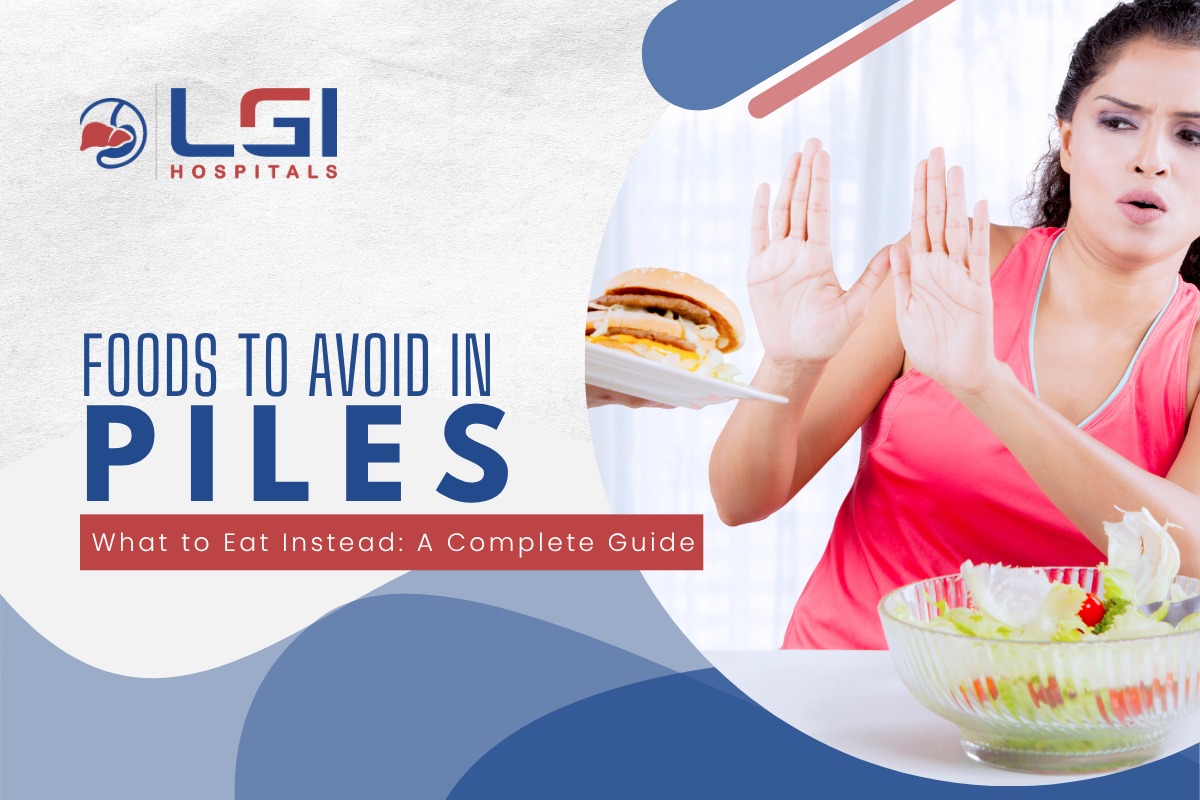Piles, medically known as hemorrhoids, are swollen veins in the rectum and anus that can cause pain, itching, bleeding, and discomfort. While medical treatment is essential in severe cases, diet plays a key role in managing the condition and preventing flare-ups. There are certain foods to avoid in piles which can worsen the symptoms, while others can support better digestion and healing.
This complete guide explains the foods to avoid in piles and highlights what you should eat instead to manage the condition effectively.
Foods to Avoid in Piles
1. Spicy Foods
Spicy food items can irritate the intestinal lining and increase discomfort during bowel movements. They may also lead to inflammation and a burning sensation, which can worsen piles symptoms.
2. Refined Flour Products
Products made with maida (refined flour), such as white bread, noodles, and bakery items, are low in fiber. They contribute to constipation, a common trigger for piles.
3. Fried and Oily Foods
Deep-fried snacks and oily meals slow down digestion and add unnecessary fat to the diet. These foods lack fiber and can cause bloating and hard stools.
4. Red Meat
Red meat is difficult to digest and low in fiber. Its consumption can lead to sluggish bowel movements and increased pressure during defecation.
5. Caffeinated Beverages
Tea, coffee, and caffeinated soft drinks can lead to dehydration. Lack of hydration causes hard stools, which aggravate the condition.
6. Alcohol
Alcohol contributes to dehydration and may irritate the intestinal lining, leading to constipation and increased discomfort.
7. Dairy Products
Heavy consumption of cheese, milk, and ice cream can lead to gas, bloating, and constipation in many people.
8. Processed and Packaged Foods
These are typically high in salt, sugar, and unhealthy fats while being low in dietary fiber. They interfere with digestion and increase the risk of constipation.
What to Eat Instead: Piles-Friendly Foods
1. High-Fiber Fruits
Include fruits like papaya, banana, apples with the peel, guava, and prunes in your daily diet. They promote soft stools and easy bowel movements.
2. Leafy Green Vegetables
Vegetables like spinach, fenugreek, cabbage, and broccoli are rich in fiber and help improve digestion and bowel regularity.
3. Whole Grains
Switch to whole wheat, brown rice, oats, millets like bajra and jowar. These grains are high in fiber and aid in smooth digestion.
4. Pulses and Legumes
Moong dal, masoor dal, chickpeas, and lentils are good sources of protein and dietary fiber that support gut health.
5. Buttermilk and Curd
These fermented foods contain probiotics that enhance gut bacteria and improve digestion.
6. Water
Drink 8–10 glasses of water every day. Adequate hydration is essential for softening stools and preventing constipation.
7. Isabgol (Psyllium Husk)
Psyllium husk is a natural fiber supplement that can be consumed with warm water or milk to support regular bowel movements.
Lifestyle Tips to Manage Piles
- Avoid delaying the urge to pass stools.
- Limit the time you spend sitting on the toilet.
- Stay active with regular walking or light exercise.
- Avoid binge eating and maintain regular meal timings.
- Eat slowly and chew your food properly to aid digestion.
Get Expert Help at LGI Hospital, Nagpur
If you are suffering from chronic constipation or piles, it’s best to seek medical advice early. LGI Hospital, located in Nagpur, offers advanced treatment options for piles and related digestive conditions. With a dedicated team of specialists, modern diagnostic tools, and patient-centric care, LGI Hospital ensures effective and compassionate treatment.
Don’t ignore the symptoms. Take the first step toward recovery. Contact LGI Hospital today and book your consultation.

